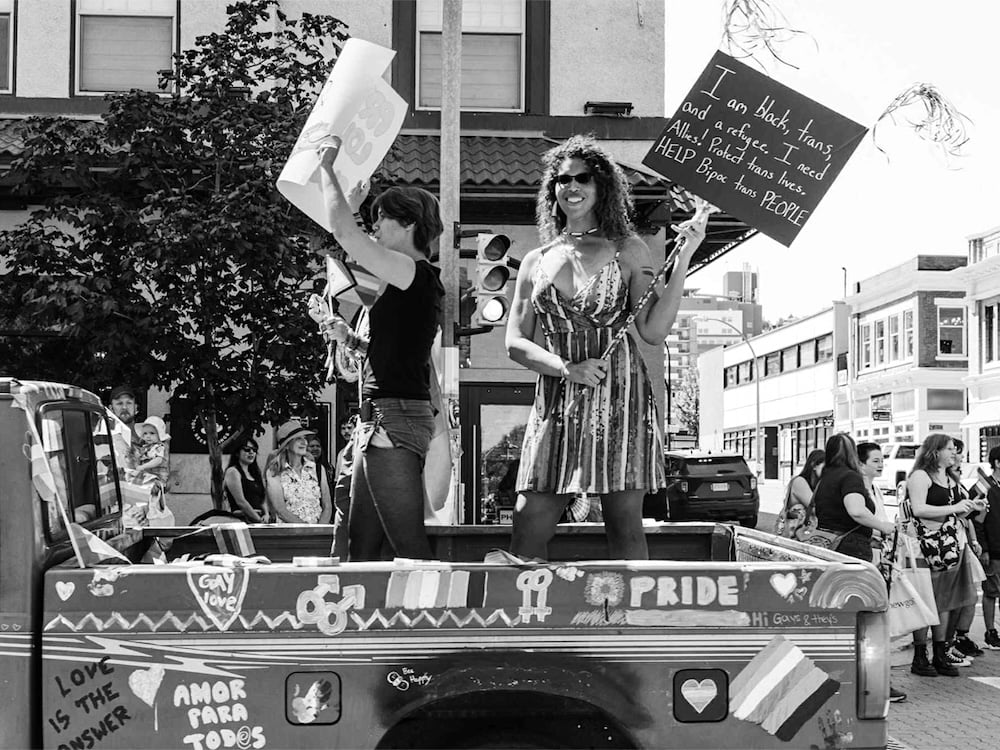Lifestyle
Black and Trans Americans Seek Asylum in Canada Amid Rising Threats

The safety of Black and transgender individuals in the United States is increasingly in jeopardy, prompting some to seek refuge in Canada. Following a controversial speech by conservative commentator Michael Knowles at the 2023 Conservative Political Action Conference, where he called for the “eradication of transgenderism,” many, including Zara Sluys X, recognized the urgent need to leave. Sluys X, a biracial Black woman, has faced severe anti-Black racism throughout her life. After a traumatic childhood incident involving violence, she decided to immigrate to Canada with her husband, who was sponsoring her application.
Currently residing in transitional housing for victims of domestic violence, Sluys X is preparing her application for Canadian asylum, citing the unsafe environment for Black and transgender individuals in the United States. The statistics are stark: in 2022, at least 32 transgender and gender non-conforming individuals were murdered in the U.S., with over half being Black trans women. A study from the University of California, Los Angeles, revealed that transgender people are four times more likely than their cisgender counterparts to experience violent victimization.
Advocates like Cait Glasson, an Ontario-based LGBTQ2S+ activist, have recognized the growing need for asylum. Glasson initiated a parliamentary petition aimed at extending asylum rights to transgender and non-binary individuals facing discrimination and violence in their home countries, specifically targeting the U.S. and the U.K. Her petition garnered more than 160,400 signatures, marking it as one of the most signed in Canada at that time.
The Canadian government’s response to the asylum process remains cautious. A spokesperson for Lena Metlege Diab, the Minister of Immigration, Refugees and Citizenship Canada, indicated that while they cannot speculate on future policy changes, asylum seekers are evaluated on a case-by-case basis. Notably, the ministry does not collect data on applicants based on gender or sexual orientation.
Sluys X believes she may be among the first Black trans individuals to seek asylum in Canada. According to data reported by Reuters, 245 out of 55,000 asylum claims in the first half of 2025 originated from Americans, representing a notable increase since 2019. Earlier this year, a Canadian Federal Court judge temporarily halted the deportation of Angel Jenkel, a non-binary American, citing a lack of consideration for the challenges faced by LGBTQ individuals in the U.S.
The climate for Black and trans individuals in America has been increasingly hostile. Victoria E. Thomas, an assistant professor at Simon Fraser University, underscores the dangers faced by marginalized communities, pointing to systemic issues like police brutality and legislative attacks on diversity initiatives. Since January 2023, significant legislative changes have targeted Black and trans individuals, with 987 anti-trans bills introduced across 49 states, 122 of which have already passed.
Legal expert A. Connie Campbell, based in Vancouver, highlights the complexities involved in obtaining asylum. Applicants must demonstrate they face persecution in their home country, which can include denial of basic services or direct threats to their safety. Campbell notes that there is currently only one documented successful asylum claim by a trans American in Canada, but the number of applications is rising.
While Canada continues to face its own challenges regarding anti-Black racism and transphobia, Thomas emphasizes the key differences in legal frameworks, particularly regarding hate speech and gun control. “Freedom of speech in America covers hate speech,” she explains. The prevalence of gun violence against marginalized communities further exacerbates the dangers faced by individuals like Sluys X.
Despite the obstacles, Sluys X and her advocates remain hopeful. She draws parallels to historical instances when Black Americans sought refuge in Canada, such as during the Underground Railroad. Sluys X questions whether contemporary systems will recognize the need for refuge and support for those facing persecution based on their identity.
As the situation unfolds, the potential for asylum claims from Black and transgender Americans in Canada raises important discussions about human rights and the responsibilities of governments to protect their citizens. The evolving landscape of legislation in the United States continues to prompt individuals like Sluys X to seek safety and belonging beyond their borders.
-

 Science3 months ago
Science3 months agoToyoake City Proposes Daily Two-Hour Smartphone Use Limit
-

 Top Stories3 months ago
Top Stories3 months agoPedestrian Fatally Injured in Esquimalt Collision on August 14
-

 Health3 months ago
Health3 months agoB.C. Review Reveals Urgent Need for Rare-Disease Drug Reforms
-

 Technology3 months ago
Technology3 months agoDark Adventure Game “Bye Sweet Carole” Set for October Release
-

 World3 months ago
World3 months agoJimmy Lai’s Defense Challenges Charges Under National Security Law
-

 Lifestyle3 months ago
Lifestyle3 months agoVictoria’s Pop-Up Shop Shines Light on B.C.’s Wolf Cull
-

 Technology3 months ago
Technology3 months agoKonami Revives Iconic Metal Gear Solid Delta Ahead of Release
-

 Technology3 months ago
Technology3 months agoApple Expands Self-Service Repair Program to Canada
-

 Technology3 months ago
Technology3 months agoSnapmaker U1 Color 3D Printer Redefines Speed and Sustainability
-

 Technology3 months ago
Technology3 months agoAION Folding Knife: Redefining EDC Design with Premium Materials
-

 Technology3 months ago
Technology3 months agoSolve Today’s Wordle Challenge: Hints and Answer for August 19
-

 Business3 months ago
Business3 months agoGordon Murray Automotive Unveils S1 LM and Le Mans GTR at Monterey









